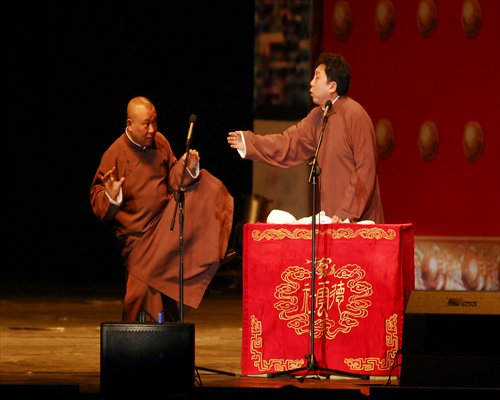Guodegang style

Crosstalk troupe De Yun She finds new home on int'l stage
In today's ever-shrinking world, having international exchanges is a natural occurrence in everything from business to show business. However, one aspect of the latter seems incapable of surviving outside its home turf - xiangsheng, or crosstalk (a traditional Chinese form of stand-up comedy).
But in recent news, the Beijing-based xiangsheng troupe De Yun She has established its first overseas branch in Melbourne, Australia.
The information came from a famous xiangsheng performer Guo Degang who wrote about it on Sina Weibo on January 23. As the founder of De Yun She, he "officially announced" the establishment of De Yun She's first overseas branch.
Although the post received comments from a number of supporters who encouraged Guo to foster and enhance xiangsheng around the world, there were definitely some mixed feelings.
The announcement raises questions about whether a language-related art could be accepted in a non-Chinese market.
Xiangsheng 101
For those who don't know much about xiangsheng, a quick lesson in crosstalk may be in order. Xiangsheng aims to entertain the audience with jokes containing puns and allusions based on tricks of the language. They usually keep the topics in tune with current events and never back away from controversial social issues. It is almost always performed by a duo through "casual" dialogues, and sometimes can include more performers or be a solo.
You may recall the American comedy team Abbott and Castello of the 1940s and 50s. Their most famous routine known as "Who's on first?" is a perfect example of this form of humor. Just imagine how difficult it would be for someone to get the jokes if they did not know English well and had never seen a baseball game.
Tracing its roots to the Ming Dynasty (1368-1644), modern xiangsheng now mainly emphasizes four skills - shuo (speaking), xue (imitating), dou (teasing) and chang (singing).
Like many art forms, xiangsheng has had its ups and downs over the centuries. Helping it reach the next peak is Guo Degang who is regarded as one of the genres most influential figures. He is credited with bringing the age-old art form to a wider audience with his troupe De Yun She.
Bad boys of crosstalk
Guo and De Yun She's rise from unknowns to household names is inspirational to crosstalk fans, but their irreverence often leads to controversy.
Guo and members of De Yun She started their performances in small teahouses with cheap tickets. They often used harsh words to criticize hot-button social issues.
Guo was once regarded as a man who swam against the mainstream. But now that he has agreed to perform at The Year of the Snake Spring Festival Gala held by China Central Television, many of his fans think he is selling out.
A Sina Weibo user with the name "Yang Ying angelababy Zainali" posted, "Guo Degang is going to the Spring Festival Gala ... is he still the infamous xiangsheng performer (which Guo used to call himself)...the taste of his xiangsheng has changed."
And "Bingsi 2012" wrote, "Guo used to strongly satirize the Spring Festival Gala, showing scorn for it. Now he goes there! He no longer belongs to the grass-roots people."
Still, there are plenty of fans looking forward to his televised performance on Lunar New Year's Eve.
Further evidence of the artist's mainstreaming middle-aged tendencies are seen from the rise in ticket prices for De Yun She's performances. Also, their performance stage has gotten bigger. And now, as the ultimate insult to their fans, Guo and his comedy troupe are taking their show outside of China.
Going abroad
In 2011, on its 15th anniversary, De Yun She kicked off their first overseas commercial performance in Australia, followed by other countries including New Zealand, Canada and the US. And according to the recent announcement, the troupe has established its first overseas home in Melbourne.
In fact, the trend of xiangsheng going abroad began much earlier. In 2010, Starry Night Comic Club founder Li Jing and He Yunwei gave a performance in the UK. In 2012, Xiha Crosstalk Club also joined the overseas exodus by launching a world tour.
How can such language based art achieve success in a foreign land? Both Xiamen University professor Zhou Ning and cultural critic, Peking University professor Zhang Yiwu believe it's the ever-enlarging Chinese expat communities that provide the market for these troupes.
"Vancouver was called Hong Kongver several years ago, and now it's called Chingouvar," Zhou said in a phone interview with the Global Times.
While Zhang thinks xiangsheng can be an interesting art form that attracts foreigners learning Chinese - such as Dashan (Mark Rowswell), the Canadian who performed crosstalk professionally - Zhou does not think De Yun She would have much success among nonnative Chinese speakers.
"Some content of [Guo Degang's xiangsheng] runs counter to Western values. For example, the mocking of the disabled, which could cause [legal] trouble," Zhou said.
Catering to the local audiences' taste is a key factor that every xiangsheng performer needs to learn.
In an interview with Beijing Business Today, Gao Xiaopan, founder of Xiha Crosstalk Club, said that when they were giving performances in Australia, they created some Cantonese jokes, because much of the Chinese audience there comes from South China. Also, they made use of local issues like the time former Prime Minister John Howard had a shoe thrown at him at Cambridge.
However, Gao noted that the lack of influential stars in xiangsheng clubs is an important factor that prevents them from enlarging the overseas market.
"We must accept that overseas investors are going for certain famous performers. And if we send out some non-star performers, it will not have a good effect," he said.